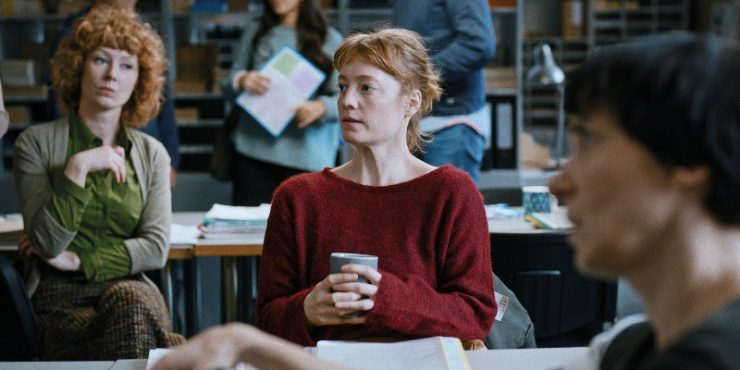In Ilker Catak’s latest feature, The Teachers’ Lounge, a school instructor must find the balance between protecting her students and protecting herself. The task proves harder than you’d think, especially as the school’s byzantine office politics prove impossible to navigate. In many ways, the film is about the fight between idealism versus reality, of being the person that you want to be measured against the expectations of others. This film is nervy and tense, and the pacing suggests a psychological thriller. Marvin Miller’s musical score bumps and prods with cryptic intrigue. The drama is interpersonal in nature, but Catak imbues the film with higher stakes with the promise of danger – what our teacher might be fighting for, may just be her life.
Leonie Benesch plays Carla Nowak, a new teacher at a German public school which is hurtling toward controversy. One of the teachers, Mr. Liebenwerda (Michael Klammer), has had money stolen from him, and he’s convinced it’s a student in Carla’s class. Procedures of interrogation and even seizure take place against Carla’s wishes. No resolution is found but the damage is done, with a culture of mistrust and prosecution being felt throughout the student body, as well as their parents. When Carla thinks she’s found evidence that it’s a member of the staff committing these thefts and not the students, she unknowingly sets off a needlessly bureaucratic process of accusation that ripples throughout the campus.
Carla’s persistence on safeguarding her students from a staff that wishes to demonize them backfires when that same student body scapegoats her – a victim of a generation that has learned the language of social liberation but lacks the critical thinking skills to apply it accurately. In the end, Carla knows it’s the adults that should rise above it – that the children are only behaving like children – but as the tension rises, she must confront her own ethic, a process that nearly undoes her very being. The Teachers’ Lounge at times feels clunky in the ways it tries to illustrate the two-sided war that Carla is fighting, but Catak properly measures the stakes here, as Carla’s life spirals quickly toward professional ruin.
Benesch’s performance, as a teacher undone by the adolescent spectacle she was trying to avoid, is a masterclass of understatement, of bubbling anxieties and battered spirit. It’s a wondrously expressive – if underplayed – piece of acting that really sells the script (by Catak and Johannes Duncker), even when the script itself feels flat. The film as a whole feels more like a proof of concept than an actual movie itself. Like Rian Johnson’s Brick, we have evidence that the director can excel within genre, but the project feels more like a promise of future greatness than excellence in the present. Benesch’s work alone is worth the exercise, and the film does succeed in making Catak a director worth looking out for.
Directed by Ilker Catak










